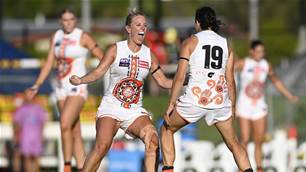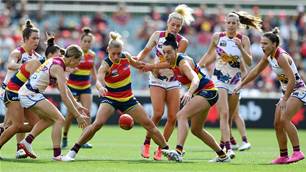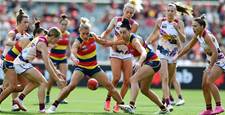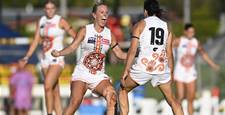On Friday, Mo Hope did what so many women and others from marginalised subject positions have wanted to do at so many points in their lives: stand up and walk away.
On a panel with Mick Malthouse and Jason Akermanis at a North Ballarat Football Club luncheon, Hope was forced to endure a conversation defined from the beginning on sexist terms.
At the time of Hope’s departure, Malthouse was discussing at length his opinion on how AFLW should be modified, not only to “improve the game aesthetically” but to make it “safer” for women. In other words, Malthouse was engaging in the kind of commentary that often surrounds women’s sport, whereby men feel entitled not only to denigrate the quality of the competition, but to offer their thoughts on how to “improve” the product – taking for granted that there is something wrong with it in the first place.
In so responding to Malthouse, Hope was subsequently described as “unprofessional”, getting her “nose out of joint”, having “attitude” and “not being used to other people’s point of view” (the latter by Akermanis). As a final insult, Malthouse noted that if only Hope had listened to his point of view, she would have “been a little wiser”.
But why should women – particularly those with a much more intimate knowledge of AFLW than Malthouse – have to listen to these men at all? Most absurd was the claim that Hope is not used to listening to other points of view, when, in fact, this is what women are most often subject to: opinions formed about, rather than with them. In refusing to engage in a dialogue with Malthouse that began with the presumption that women’s football is somehow deficient, she was neither unwise nor unprofessional – rather, she took a stance to say “enough is enough”.
Perhaps most insulting was Malthouse’s assertion that he didn’t like women’s football “because I’ve got four granddaughters”. Malthouse went on to explain that he didn’t want them to “play sport where it’s perceived to be rough and tough and get injured”:
"I don't like it [AFLW] in its present format ... they subject themselves to massive injuries. I suggested the ball should be smaller and should be no bumps and only tackle, not go to ground, that would make it uniquely women's football," he said. "I'm all for women playing sport, however the casualty wards in hospitals have too many girls with broken collarbones, busted knees, et cetera."
In other words, Malthouse is worried about his granddaughters playing football because they might “injure” themselves in a “rough and tough” pursuit – by participating in a sport decidedly “unfeminine”.
Such gender stereotyping was reflected in talkback calls on Melbourne radio station 3AW, where, one by one, men responded to Susan Alberti’s defence of Hope’s actions with concerns for women’s reproductive systems, or propensity for concussion.
"What was she supposed to do?"
— 3AW Melbourne (@3AW693) September 28, 2018
Female footy trailblazer jumps to defence of "terribly upset" Mo Hope https://t.co/j5mHVEubXz pic.twitter.com/9a0XHHZMda
What men by and large were worried about it, it seemed, was women’s autonomy to decide what they do with their own bodies – be it to put them at risk, or to commit them to un-“ladylike” pursuits.
It should go without saying that men who participate in Australian rules football (or rugby league, or any other sport for that matter) also put their own bodies at such risk. Those choices, however, are not questioned in the same way women’s are, because men are seen as having autonomy over their bodies and their decisions, while women’s bodies – in the minds of dinosaurs like Malthouse at least – are still subject to men’s control.
That men are worried about women’s “reproductive systems” in particular is a disheartening throwback to what one would hope is a bygone era where men felt entitled to control women’s reproductive choices.
In response to the comments of Malthouse and Akermanis, Hope’s choice to walk out did not equate to silence. Instead, she took to social media to say she was “embarrassed, ashamed, humiliated and disgusted” by his comments:
“I love OUR game and I will never, ever let anyone tell me or any girl we don’t belong or deserve to pull this jumper on at this level. We are one.”
Hope’s words are striking in a time when AFLW is under great threat. While the AFL may not have moved to instigate a no tackle rule, or to eliminate the bump as Malthouse suggests, the game’s rules and fixture continue to be tweaked and experimented with by those in power who refuse to listen to what players and fans want.
In 2017, AFLW rode in on a glorious wave of cultural change that felt unremitting and incapable of being reversed. Finally, women had the opportunity and national stage to play that felt like an acknowledgement of, and beginning of a correction to, over a century of exclusion and marginalisation. But now more than ever it needs champions like Hope to be brave enough to assert themselves in the face of the increasing backlash to the opportunities that wave provided.
Related Articles

Socceroo star's message to kids: Don't be an AFL player

Updated: AFLW Round 2 preview and schedule

.png&h=600&w=850&c=0&s=1)











